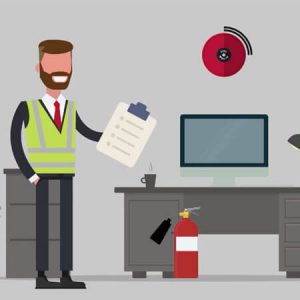Additional Hints and Tips for Fire Drill Supervisors
 Under the Regulatory Reform (Fire Safety) Order, it is a legal requirement that a ‘Responsible Person’ is designated within each commercial property to oversee all facets of fire safety. From carrying out a risk assessment that identifies potential hazards, to ensuring that the correct equipment (alarms, extinguishers etc.) is installed and properly maintained.
Under the Regulatory Reform (Fire Safety) Order, it is a legal requirement that a ‘Responsible Person’ is designated within each commercial property to oversee all facets of fire safety. From carrying out a risk assessment that identifies potential hazards, to ensuring that the correct equipment (alarms, extinguishers etc.) is installed and properly maintained.
Fire drills form a vital part of the overall fire safety within a premises, and must be carried out on a regular basis to check for efficacy and any potential oversights. Included should be a detailed escape route and specified assembly point (ideally 50 metres from the building and not blocking access for emergency vehicles), as well as information regarding raising the alarm and the location of fire exits.
However, there are a few other useful hints and tips that can help those trained fire marshals charged with carrying out and overseeing fire drills…
1. Identify Hazards
Observing a fire drill is the perfect opportunity to spot imperfections to the escape plan. Whether this is identifying any difficulties people may be having in using the evacuation route, or the location of the assembly point being unsuitable (for example, having to cross a busy road to access it), spotting and rectifying these things during a drill can save lives in the event of a real fire.
2. To Inform or Not to Inform?
Whether or not to let a building’s occupants know that a fire drill is imminent is a matter of much debate. One school of thought suggests that, if in possession of the knowledge that there is no real danger, the level of attentiveness paid to following correct procedure may be low. The other side of the argument points out that carrying out an unscheduled drill can panic people unnecessarily, and may endanger safety in this way. Professionals would recommend the former as the way to go, ensuring that all persons on the premises are fully informed as to their responsibilities, and underlining the importance of following procedure correctly and accurately.
3. Nominate Observers
Depending on the size of the property, there may not be a sufficient number of fire marshals on hand to fully observe every aspect of the drill. Requesting that a few extra people act as ‘observers’, noting any incorrect behaviour or areas of difficulty along the escape route and reporting back to marshals, can help to increase the chance of spotting any potential faults with the evacuation plan.
4. Test Alternatives
While every precaution is taken to avoid it, unforeseen circumstances could lead to your evacuation procedure being compromised in some way, whether a blocked route to a fire exit or a fault with a fire door. Similarly, your primary assembly point may be inaccessible due to inclement weather conditions or fallen debris. This requires backup routes and plans to be put in place, and fabricating an issue during a drill that necessitates their use is a good way to test their efficacy.
5. After the Drill
Record, review and rectify. Make a note of any relevant observations (positive and negative), and set aside time to go over these notes before subsequent fire drills, making changes to any areas of perceived weakness – whether this is altering the location of the assembly point or putting measures in place for any building occupants with mobility issues.
Watch our Workplace Fire Safety video which explains the role of the ‘Responsible Person’ and the importance of fire drills.
Contact us for fire warden training Call for more information on 020 31241 632
Request a Callback
Just fill in your details below and we'll get back to you as soon as we can!

About Scutum London
Scutum London is a leading expert in fire safety and security solutions for businesses and organisations located across South East England, including London and Surrey.
From fire alarms, fire extinguishers and fire risk assessments to access control, CCTV and intruder alarm systems – and a lot more besides – we offer a comprehensive range of products and services designed to keep you, your business and your staff and visitors safe.
With decades of industry experience to call on, we’re proud to hold accreditations from leading trade associations and bodies such as British Approvals for Fire Equipment (BAFE), the British Fire Consortium, the Fire Industry Association (FIA) and Security Systems and Alarms Inspection Board (SSAIB).
If you’d like to find out more about Scutum London, get in touch with our friendly team or explore our products and services on our site.

